Best Prenatal Vitamin Guide
By Maia James, with research and recommendations by Michael Hopkins, PhD
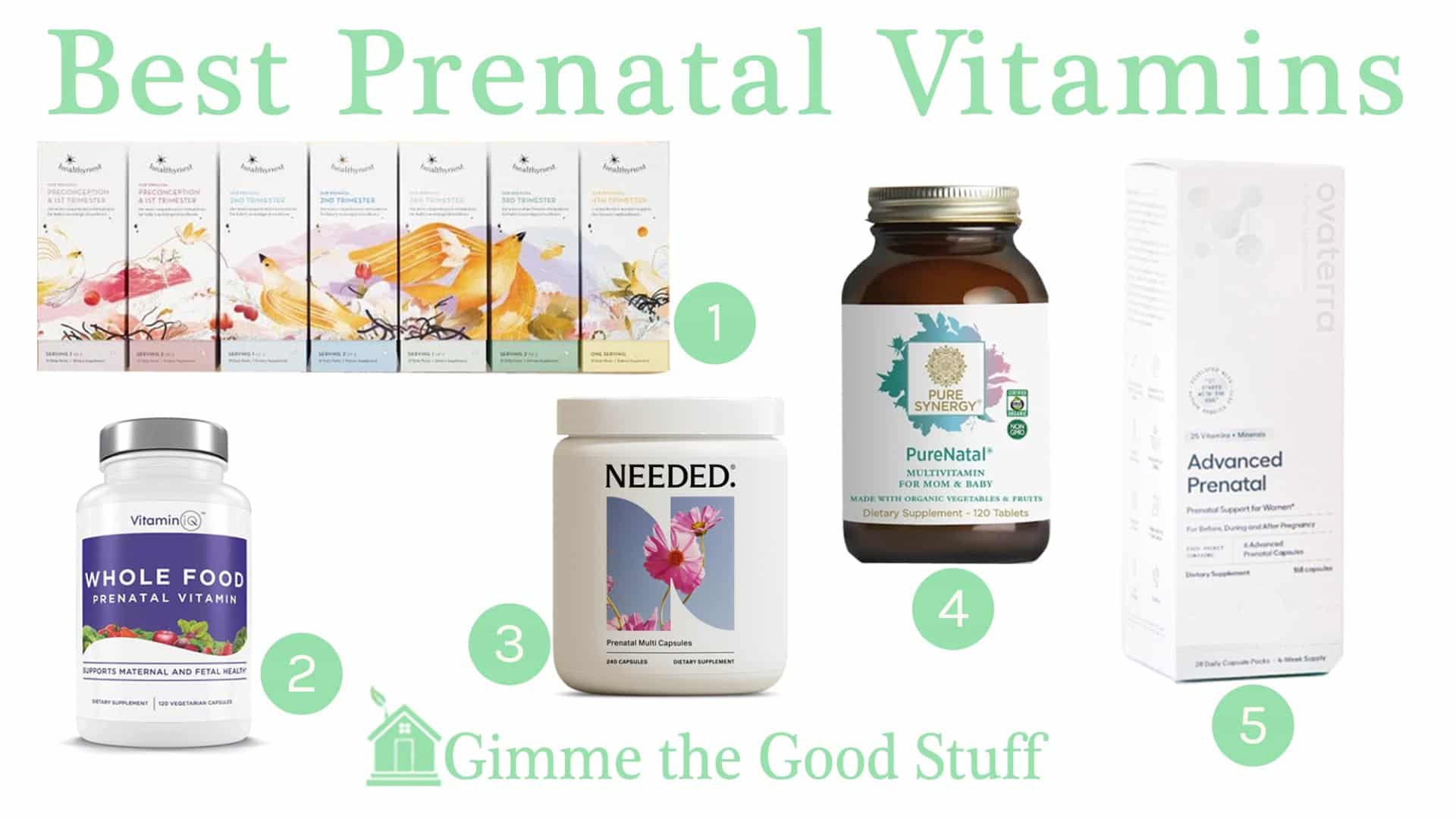
1. Healthybaby / 2. Vitamin IQ / 3. Needed / 4. Pure Synergy / 5. Ovaterra
This guide aims to our readers easily find the best prenatal vitamins for their specific nutritional needs. The good news is that MOST people will need the same basic prenatal supplement when pregnant. Dr. Hopkins provided us with robust information about prenatal nutrition in this post if you want to learn more about how you can get nutrients from food.
Otherwise, this post will go over everything you need to know about selecting the best prenatal vitamins–and which brands we think are Best, Good, Okay, Bad, and Sneaky Stuff.
Let’s get to it!
Are Prenatal Vitamins Even Necessary?
Dr. Hopkins began his research by helping me answer this fundamental question about the best prenatal vitamins: do we need to be taking prenatal at all?
Indeed, it seems that we do.
There is widespread consensus that the most essential prenatal nutrients are:
- Folate–for neural tube closure.
- Calcium–for bone development.
- Iron–for oxygenation of blood.
- Vitamin D–for healthy bones, teeth, skin, and vision.
In addition, there is emerging data to support a growing list of other nutrients that are also particularly important during gestation. These include choline, omega-3 fatty acids, and vitamin A.
(You can of course find plenty of data to support the importance of ALL essential nutrients during pregnancy. Our goal with this guide was to identify the most important items to supplement during the fetal development period.)
Can You Get All Pregnancy Nutrients from Food?
This will come as a surprise to no one, but the best way to receive our nutrients is from food. Even the best prenatal vitamins should not be viewed as a replacement for a healthy pregnancy diet.
Women should familiarize themselves with which foods are the best sources of the essential nutrients that are most important during pregnancy. Again, you can do that here.

Importantly, the recommended daily intake for several vitamins and minerals is elevated for pregnant and lactating women. Even with a well-balanced, nutrient-rich diet, it can be difficult for some women to meet optimal levels.
For that reason, I am on board with taking a prenatal supplement while trying to conceive and during pregnancy and lactation.
Note that the FDA’s guidelines for recommended daily allowances (RDA) tend to focus on the minimum dose necessary to avoid health complications. There is strong evidence that for several nutrients, much higher doses than the RDA values are beneficial to pregnant women. Therefore, you’ll notice that some nutrients in some of the brands we recommend exceed the RDA by a fair bit.
Should You Take a Supplement While Breastfeeding?

There are sometimes significant differences in nutritional guidelines between gestating and lactating women. For instance, non-pregnant women need 18 milligrams of iron per day. For pregnant women, that goes up by 50% (27 milligrams), and for lactating women it goes down by 50% (10 milligrams). Pro tip: I love this collection for lactating women. Use code GIMME20 for 20% off.
How to Choose the Best Prenatal Vitamin
Okay, so you know you want to take a prenatal supplement. Now, how do you choose which one? Dr. Hopkins recommended the following five steps. Luckily, you can ignore this because he cuts to the chase and recommends five specific brands, below, under The Best Stuff.
If you want to figure out the best brand for yourself, you should:
- Asess your own eating habits to determine specific areas where a supplement will be beneficial.
- Confirm that the prenatal brand you’re considering has been tested by a third-party lab to confirm purity and a match between what’s listed on the label and what’s in the capsule. Unfortunately, this is not something you can take for granted!
- Check for fillers or other “sneaky stuff” that may actually have negative impact on your or your baby’s health.
- Make sure that your chosen prenatal doesn’t contain nutrients in quantities large enough to pose toxicity risks.
This list is super overwhelming to me, so Dr. Hopkins and I came up with specific criteria, questions to ask manufacturers, and an organized vetting process to identify the best prenatal vitamins.

What to Look for in Prenatal Vitamins
Here are the primary nine factors we considered when reviewing popular prenatal vitamin brands.
Food-Based Versus Synthetic Vitamins
Let’s get something out of the way: there are no truly food-based prenatal supplement on the market.
By definition, a whole food supplement consists of the food source itself that has been concentrated into a powder (via dehydration). The volume needed for a proper condensed food powder would be more than you could ever pack into pills. Therefore, the only way to get a truly “food-based” supplement would be by swallowing an entire capsule (or multiple capsules) for a single nutrient.
Because of this, every prenatal vitamin system (even the ones with 10 pills per day!) contain synthetic nutrients. Sometimes the capsule will ALSO contain some amount of dehydrated food-based powder, but this does not make it a “food-based,” in our opinion.
Instead of calling any vitamin brand “whole food,” we can only indicate whether the tablets/capsules contain an added food blend or not. As you’ll see below, the whole-food powder is typically just a small fraction of the total content and is not the primary source of the vitamins on the label.
There are three primary ways that essential nutrients are sourced for vitamin capsule or pill (and in practice, the first two are really the same):
- Synthetic United States Pharmacopeial Convention vitamins. These are the FDA-approved standard and what takes up most of the space on the ingredient labels of vitamin jars, even those brands marketed as “food-based” or “whole food.” These can be “nature-identical,” meaning the chemical structure and shape are indistinguishable from the food nutrient. (This is true, for example, with ascorbic acid as vitamin C.) However, these synthetics can also be merely chemically similar to the food version, which may alter the way enzymes in our bodies interact with them. This is why we sometimes make recommendations on the synthetic versus naturally occurring vitamins. For instance, vitamin E as d-alpha tocopherol is the natural, safer version, and the synthetic version–dl-alpha tocopherol–should be avoided.
- Isolates from naturally occurring sources. These are isolated down to their pure chemical structure. Therefore, they do not contain the matrix of other compounds that you would get from any actual food-source. Isolates undergo significant processing using various solvents and chemical excipients. Both synthetic and naturally-derived isolates can have different final versions, based on the process used to isolate or synthesize the vitamins. Some forms may be more bioavailable or more gentle on your stomach than others. Many vitamins are purposefully combined with some other compound (salts, methyl groups, chelartion, etc.) to make the nutrient more readily absorbed or less likely to cause digestive issues. Our recommendations have less to do with whether a vitamin is synthetic or natural, and more to do with what other compound has been paired with the vitamin isolate. For example, methylated folate (and other B-vitamins) or minerals like iron and zinc should be bound to organic compounds (chelated) to aid with absorption.
- Fermentation in yeast. When isolated vitamins (synthetic or natural) are cultured in a yeast broth, the yeast will metabolize and break down certain components of the chemical structure. We feel it’s somewhat Sneaky for brands to culture isolates in yeast and then advertise them as “whole foods.” But yeast fermentation is a valid technique for making the pure isolates more bioavailable. That said, Dr. Hopkins couldn’t find primary science to clearly demonstrate the efficacy of this process. As a result, we don’t use yeast fermentation as a Good Stuff inclusion criterion, but we do count this as a bonus when evaluating vitamins. (Please note that fermenting vitamins in yeast does not produce probiotics.)
Inclusion of Lesser-Known Important Nutrients
At the beginning of this post, we mentioned seven nutrients that are critical for a healthy pregnancy. These are what you’ll find in the best prenatal vitamins.
Keep in mind, though, that some of these nutrients are really easy to get from food. And some are better absorbed when combined with other specific nutrients (more on this in a minute). We took all of this into account when reading the labels of some of the most popular prenatal vitamins on the market.

For instance, gestational supplementation of choline has been linked with decreased risk of neural tube closure pathology and improved cognitive function in babies. But choline is not found in many prenatal vitamins.
Given the high rates of choline deficiency in the U.S., we gave bonus points to the brands of prenatals that included a food-based version of this nutrient.
Vitamin D2 Vs. D3

Vitamin D2 (ergocalciferol) is plant-derived and D3 (cholecalciferol) is typically animal-derived. Recently, D3 that is derived from lichen has become a popular vegan version of the “better” vitamin D. (It’s worth noting that sourcing D3 from lichen is controversial– it’s super slow-growing and harvested from the wild, which disrupts the local ecosystem.)
Studies have shown that D3 supplementation is more effective at raising vitamin D blood levels than is D2. However, our skin produces D3 in the sun, so if you have regular access to sunshine, this is probably not such a big deal.
If you are not vegetarian, you should try to find a supplement with D3 rather than D2. If you are vegetarian, try to make sure you get some sunshine, or look for a vitamin with lichen-derived vitamin D3.
Interactions Between Essential Nutrients
Many different factors influence bioavailability, which refers to how much of a given nutrient is actually absorbed and metabolized by our bodies.
Determining bioavailability is complicated. The source of the nutrient, how it is cooked or prepared, and the other foods or nutrients that are consumed at the same time all influence bioavailability.
It’s impossible to predict the ways that different foods in different combinations will interact to affect the bioavailabilty of one nutrient versus another. This is just another reminder to get nutrients from food as much as you can!
There are a few combos of nutrients that deserve special attention.
Iron & Calcium
Calcium inhibits the absorption of iron, and both are important essential nutrients for pregnant women. For that reason, many prenatal vitamins contain very little calcium.
The strategy we recommend is to find a prenatal supplement high in iron and try to avoid eating a calcium-rich meal (i.e. high in dairy) when you take the prenatal. Instead, eat calcium-rich foods a few hours apart from when you take your prenatal.
Iron & Vitamin C
The type of iron (non-heme) that you get from supplements and fortified foods should be taken with vitamin C when possible.
Vitamin C helps aid the absorption of non-heme iron, so you can also aim to consume vitamin C rich foods with your prenatal. (You can read a bit more about iron below under “Possible Nutrient Toxicity Risks.”)
Vitamin D & Calcium
Vitamin D is essential for the absorption of calcium. You can help ensure that you’re getting enough calcium by consuming calcium-rich foods with foods high in vitamin D, such as egg yolks and fortified milk.
If you are vegan you may consider taking a calcium supplement during pregnancy. While there are several different forms/sources of calcium such as calcium carbonate and calcium citrate, it appears that all of these are absorbed equally by the body.
Keep in mind that the amount of calcium your body absorbs is inversely correlated with amount of calcium ingested (above 500 milligram). For instance, it’s better to take two 500 milligrams doses of calcium twice a day than one 1,000 milligram dose.

Enteric Coating
Stomach acid can affect vitamin bioavailability. Acid breaks down nutrients in supplements before they arrive in the intestines, where they can be absorbed.
Supplement tablets can be coated with enteric polymers to increase the bioavailability of nutrients. The coating won’t dissolve at the very low pH levels found in the stomach, and instead dissolve once the pH becomes more neutral.
Unfortunately, enteric coating can be made from methacrylic acid copolymer, which is absolutely not “Good Stuff.” Fortunately, it can also be made from a plant-derived cellulose coating derived from algae.
Bottom line: If you have a sensitive stomach you may want to look for a prenatal with a plant-cellulose enteric coating.
Third-Party Testing
You’ll want to make sure that whatever prenatal vitamin you choose is third-party tested.
This is not the same as having “seal-of-approval” labels—even if these are from the NIH, or they proclaim that a supplement is “non-GMO verified.”
True third-party testing means that a laboratory measures the actual contents of the formula against the label claim to see if they match. They also should be testing for contaminants such as heavy metals, pesticides, and solvents.
Let’s provide an example. When it comes to folate, the amount in the pill is often more than the claim on the label. This matters because folic acid has about 70% higher absorption rating than food-based folate or methylfolate. This means that a folic acid content of 800 micrograms is actually the equivalent 1360 micrograms of folate—in addition to whatever you’re getting from your diet.
You really can’t trust a lot of information on websites that have ranked prenatals (except this one, lol). This is because often these websites are using outdated or misinformation. For example, we found that Reviews.com has a lot of misinformation about which prenatals have been third-party tested. After doing some fact-checking, we found that several vitamins that were listed as having not been third-party tested actually were tested. Perhaps this is because the information on Reviews.com was outdated, or perhaps it was just wrong.
Either way, you can’t simply trust what you see posted online in the vast and complicated world of prenatal supplements!
The best prenatal vitamin brands will be those that have been third-party tested. Once you decide on a particular brand, you should double check to ensure that the formulation you are buying–and not some previous recipe–was tested.
Inclusion of Questionable Ingredients (Sneaky Stuff)
Ideally, you’ll avoid any prenatal that contains food colorings, fillers, and additives.
According to a LabDoor report, four of twenty-two products contained at least one artificial coloring agent (Blue 2, Yellow 6, and/or Red 40).
Other “watchlist” or questionable ingredients identified by LabDoor are: cornstarch, polyethylene glycol, polyvinyl alcohol, sodium benzoate, sodium selenate, sucrose and corn syrup solids, carmine, caramel color, titanium dioxide, butylated hydroxytoluene, and benzoic acid.
Magnesium stearate is a common anti-caking additive. It’s not a dealbreaker; it gets an EWG Skindeep score of just 1 and is generally considered harmless. Still, the inclusion of this ingredient in purely for manufacturing purposes as it possesses no nutritional value. Moreover, when you see magnesium stearate on the label, it’s usually not alone. There is normally at least one other filler or preservative.
Possible Nutrient Toxicity Risks
It’s important to know that amount of a given nutrient that your body actually needs will also determine how much is absorbed. Fortunately, for most nutrients, any excess that is not needed by the body will be excreted in the urine.
But there’s a caveat, and to understand it you need to understand the difference between fat-soluble and water-soluble vitamins. Here goes.
Just as the name implies, water-soluble vitamins dissolve in water. This makes them more readily available for use in various tissues and also easily excreted when there are excess amounts in the body.
Vitamins in the B-complex and vitamin C are water-soluble. Although it is possible that ingesting these vitamins in excessive amounts for prolonged periods of time can cause some gastrointestinal discomfort, there is very little real risk of “vitamin overdose” (hypervitaminosis).
Fat-soluble vitamins, on the other hand, are dissolved in lipids where they enter through the small intestine and are generally stored for later use.
Because they are stored in tissue, fat-soluble vitamins are not as easily excreted and prolonged excessive intake can lead to hypervitaminosis.
The fat-soluble vitamins include A, D, E, and K. Dr. Hopkins feels that it is basically impossible to overdose on any of these vitamins from your diet. Only ingesting excess vitamins in the form of supplements can pose any vitamin toxicity risks.
A few nutrients do merit mention when it comes to potential toxicity:
Preformed Vitamin A
Two forms of vitamin A are available in our diet:
- Preformed vitamin A (retinol and retinyl ester) comes from animal sources.
- Provitamin A carotenoids (beta-carotene being the most important) are plant-derived.
Preformed vitamin A (retinol) can build up in the liver and become toxic at high doses. This condition is called hypervitaminosis A.
The important point here is that the toxic effects of vitamin A are only associated with animal-derived and synthetic retinol. Neither plant-derived nor synthetic beta-carotene pose any risk. So, don’t worry about vitamin A toxicity from beta-carotene, even if it’s synthetic. Do worry about excessive vitamin A intake from supplements that contain synthetic retinol.
We can’t recommend steering clear of all synthetic vitamin A because some percentage of the population has a genetic polymorphism that prevents them from being able to convert beta carotene to its active form. Therefore, the best prenatal vitamins usually have a mix of synthetic and natural vitamin A in order to cover everyone.
Readers of this website are very unlikely to be vitamin A deficient. Still, the right supplemental vitamin A can provide peace of mind without risking hypervitaminosis.
Dr. Hopkins feels that the ideal prenatal supplement will contain a mixture of beta carotene and retinol (retinyl palmitate). We gave brands a bonus is for being food-derived and not synthetic.
Synthetic Vitamin E
Naturally-occurring vitamin E consists of eight related compounds. The most important of these is alpha-tocopheryl, usually listed as d-alpha tocopheryl on a supplement label. (The synthetic isolate will begin with “dl” instead of “d.”)
Many websites reference the “problematic” and “potentially toxic” concerns about synthetic vitamin E. After doing some digging, we concluded that the only clear problem with synthetic vitamin E is that it is not absorbed well (less than 50%).
There does not appear to be evidence that excessive vitamin E poses any health risks when obtained through food. However, supplemental vitamin E can have toxic effects—like increased risk of hemorrhagic stroke and congenital heart defects in newborns—-at very high doses.
Unlike other vitamins, this toxicity risk appears to hold true whether the dose is natural or synthetic, but only from supplementation (not from food).
Iron
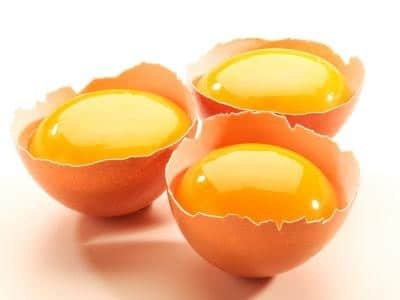
Iron needs double when pregnant, and supplementation is sometimes needed for vegetarian women in particular.
Iron overdose is a significant concern for young children, but you’re more likely struggle with anemia during your pregnancy than with excessive iron intake.
Folate/Folic Acid

In view of the link between folate intake and fetal neural tube defects, all people capable of becoming pregnant should consume folate. Most experts agree that supplements or fortified foods so be consumed in addition to the intake of folate from a varied diet.
Folate is a naturally occurring nutrient found in food, and folic acid is a form of synthetic folate.
Having the MTHFR gene mutation inhibits the way your body processes folic acid, and therefore anyone who knows they have this mutation should look for supplementation with methylated folate, a more bio-available form.
Despite several websites warning about the risks of excessive folate intake, there is actually no upper limit for food-derived folate. The upper limit of folic acid, which is synthetic folate, is 1,000 micrograms per day.
Note that there is a risk of excess folate masking a B12 deficiency. This can happen because the folate supplement will prevent the symptoms of anemia that are associated with deficiency of either B12 or folate; it will not prevent the progression of neurological damage that accompanies B12 deficiency.
The bottom line here is that the best prenatal vitamins will have methylated folate, rather than folic acid. If a supplement does contain folic acid, there is no reason for it to ever be higher than 600 micrograms.
Omega Fatty Acids

You’ve probably heard a lot of buzz around how crucial omega-3s are for the optimal development of a fetus.
While omega-6 fatty acids are abundant and readily available, omega-3 fatty acids make up a much lower proportion of the modern American diet.
Because omega-3 and -6 fatty acids are essential nutrients (cannot be synthesized by the body), they must be consumed in the diet. This means they are transferred via the placenta from the mother to fetus.
There is a general consensus among medical professionals that pregnant women in the United States and Canada do not get enough omega-3 fatty acid, specifically DHA. Both the EPA and The ACOG recommend that pregnant women consume twelve ounces (340 grams) of seafood per week from low-mercury species.
The recommended two servings of marine food per week will provide an average intake per day of 100 to 250 milligrams total of omega-3 fatty acids. Of that, 50 to 100 milligrams will be of DHA. For women following this recommendation, the remaining 200 to 250 milligrams of recommended DHA will have to come in supplement form.
This study suggests that omega-3 supplementation during pregnancy significantly reduces the risk of premature birth. We feel that in addition to eating low-mercury fish when pregnant, it makes sense to take a fish oil supplement.
Omega fatty acids (like DHA) generally cannot be combined in the same pill as a prenatal because the oil will turn rancid if it’s exposed to minerals. Ritual is one of the only companies that combines the DHA into its multi; they have a separate capsule-inside-a-capsule design to hold these ingredients apart from one another.

Ranking the Best Prenatal Vitamins
Once we decided what we wanted to find in prenatals, the next step was looking at the options available and categorizing them into Best, Good, Okay, Bad, or Sneaky Stuff.
In terms of which is the best vitamin for YOU, some of that depends on your lifestyle and circumstances—you’ll see that, for example, a few of them are vegan, and the amounts of iron differ significantly. (See below for a helpful cheat sheet.)
In order to make our Best Stuff category, a vitamin brand needed to:
- Provide third-party lab Certificate of Analysis (COA) that confirm both the absence of contaminants and a validation of the ingredients listed on the label.
- Contain methylated folate and choline.
- Contain the natural version of vitamin E.
- Contain D3, derived from either lichen or lanolin.
- Contain natural B12 as methylcobalamin, with or without adenosylcabalamin.
- Be organic, if it includes a food-blend.
- Be free of preservatives, additives, colors, and fillers.
Below is a handy cheat sheet of the our top five brands. Here you’ll see how they differ so that you can choose the best prenatal vitamin for your needs.
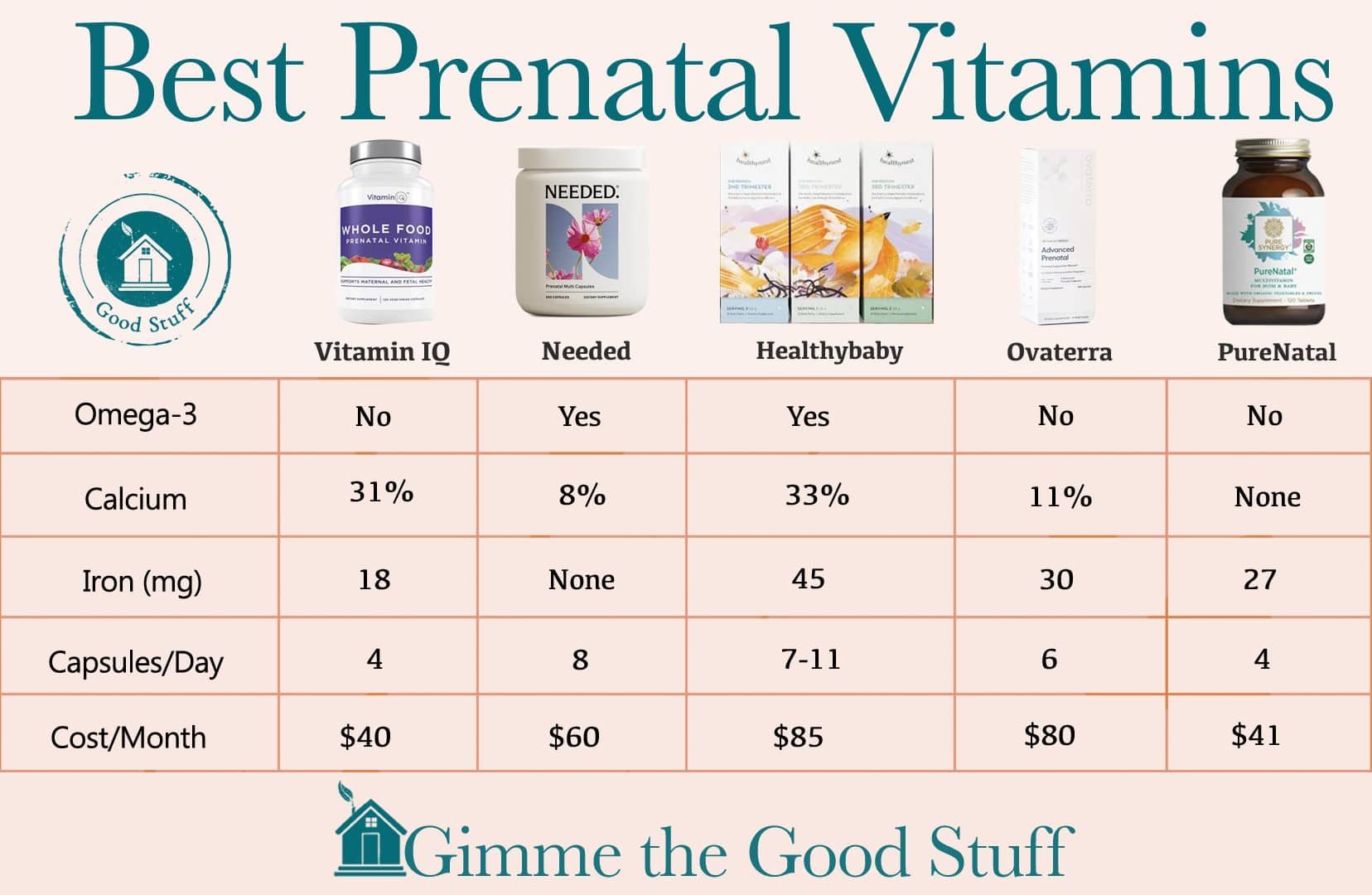
Under the Good Stuff heading, you’ll find those brands that didn’t quite make Best Stuff criteria. We still really like these brands, either because I’ve gotten to know them throughout my years in this space, or because Dr. Hopkins thought there was something extra special about them.
The Okay Stuff includes brands that we’d feel fine taking ourselves but have additives that aren’t necessary.
Finally, the brands listed below under Bad Stuff or Sneaky Stuff are the ones that do not perform any third-party testing and contain ingredients we think are flat-out not safe.
Prenatal Vitamin Brands We Cannot Rank
Unfortunately, there are a bunch of brands that we cannot include in our ranking below. These vitamin companies were either unresponsive to our inquiries or failed to provide COA proving their purity and/or validation of ingredients.
This doesn’t mean these brands are not great–likely, many of them are. But without third-party testing information, we are unable to highlight the following eight brands among the best prenatal vitamins.
The following eight brands of prenatal vitamins would have qualified as Best Stuff if we had received third-party test results.
- Goop.
- Innate Response. Things that make Innate special are that it is affordable, contains 300 mg of choline, and uses the yeast fermentation process described above.
- New Chapter. They also perform the large-batch yeast fermentation process to make the vitamin more easily digested, at least in theory.
- Actif. One appealing thing about this brand is that it’s only one pill a day!
- Perelel.
- Sakara.
- EU Naturals.
- Naturelo.
There are also three brands that we likely would have called Good Stuff–these contain additives, but nothing of concern. Without the COAs we couldn’t call the following brands Good.
Finally, there is one prenatal vitamin brand that would have been in our Okay Stuff section if we’d received a COA from a third-party lab.
- Honest Company. Lists guar gum, “natural flavors,” and magnesium stearate on its ingredients label.
Now we can move on to the prenatal vitamin brands that we did rank.
Best Stuff
Healthybaby Our Prenatal
Healthybaby’s prenatal vitamin system is unlike anything else on the market. There are four customized formulas that you move through as you pass from preconception all the way to postpartum.
Healthybaby relied on the Neurological Health Foundation to develop this prenatal with optimal levels of nutrition for both mother and baby based on clinical research. You will need to take as many as 11 pills per day with this regime, but the thoughtfulness with which Healthybaby designed this vitamin is unsurpassed. It comes with fish oil capsules but is otherwise vegetarian.
Healthybaby provided us with multiple COAs from third-party sources to demonstrate that these vitamins are free of contaminants and as potent as they claim to be.
Cost per month: $85
Use code GIMME15 for 15% off, including subscriptions.
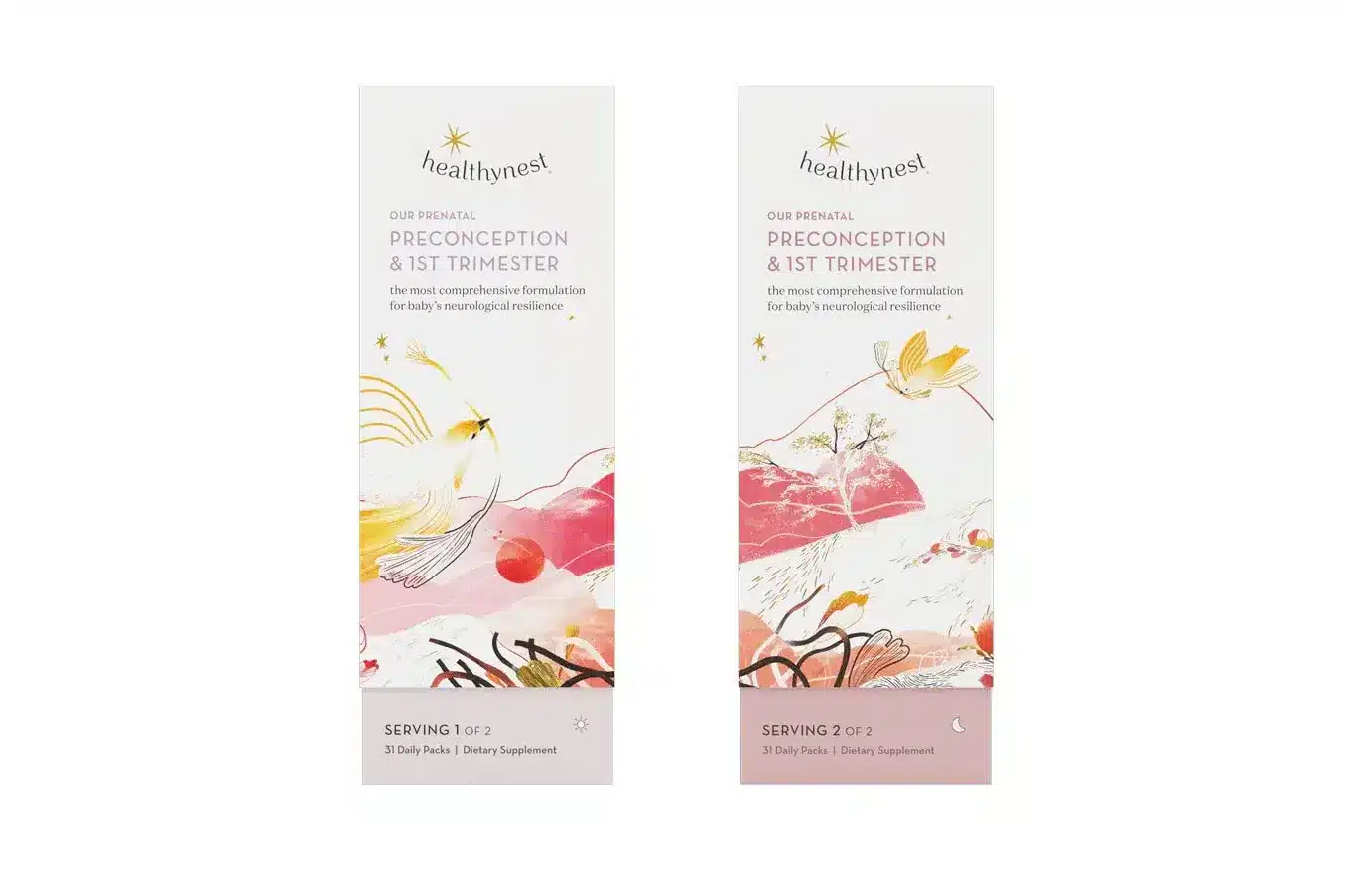
Needed Prenatal Multi
We love that Needed quickly produced a COA confirming their purity and potency. Needed’s prenatal also contains more choline than most, and their antioxidant food blend is organic. Needed’s prenatal multi comes in a pill or powder form.
I especially love Needed’s Complete Plan, which includes a pleasant-tasting omega-3, a perinatal-specific pre/probiotic, and a collagen protein that dissolves easily into everything. Please note that the Needed prenatal does not contain iron.
Cost per month: $60
Use code GIMME20 for 20% off everything.
Ovaterra Advanced Prenatal
Ovaterra is a good option if you want a vegan prenatal. Ovaterra doesn’t contain any fish oil and their vitamin D3 comes from lichen. Ovaterra provided us with proof of their third-party testing. You’ll need to take eight capsules a day if you choose this prenatal system.
Cost per month: $80
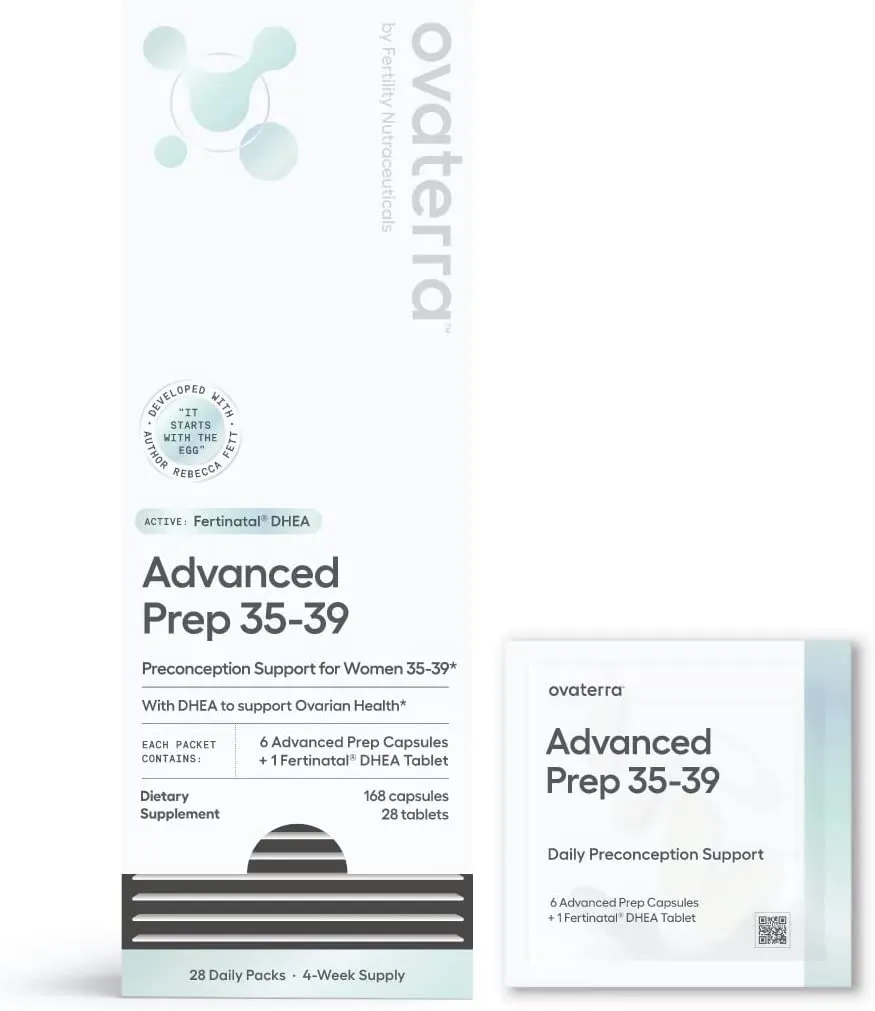
Pure Synergy PureNatal Multivitamin
We like that this brand uses the yeast method outlined above, which (at least in theory) makes this prenatal easier to digest and have better bioavailability. Four pills a day are required, which is fewer than most of the other Best Stuff prenatals.
Pure Synergy skips the calcium but provides a good amount of iron. Given that most people get plenty of calcium and that it impedes the absorption of iron, we agree with this logic.
Cost per month: $41
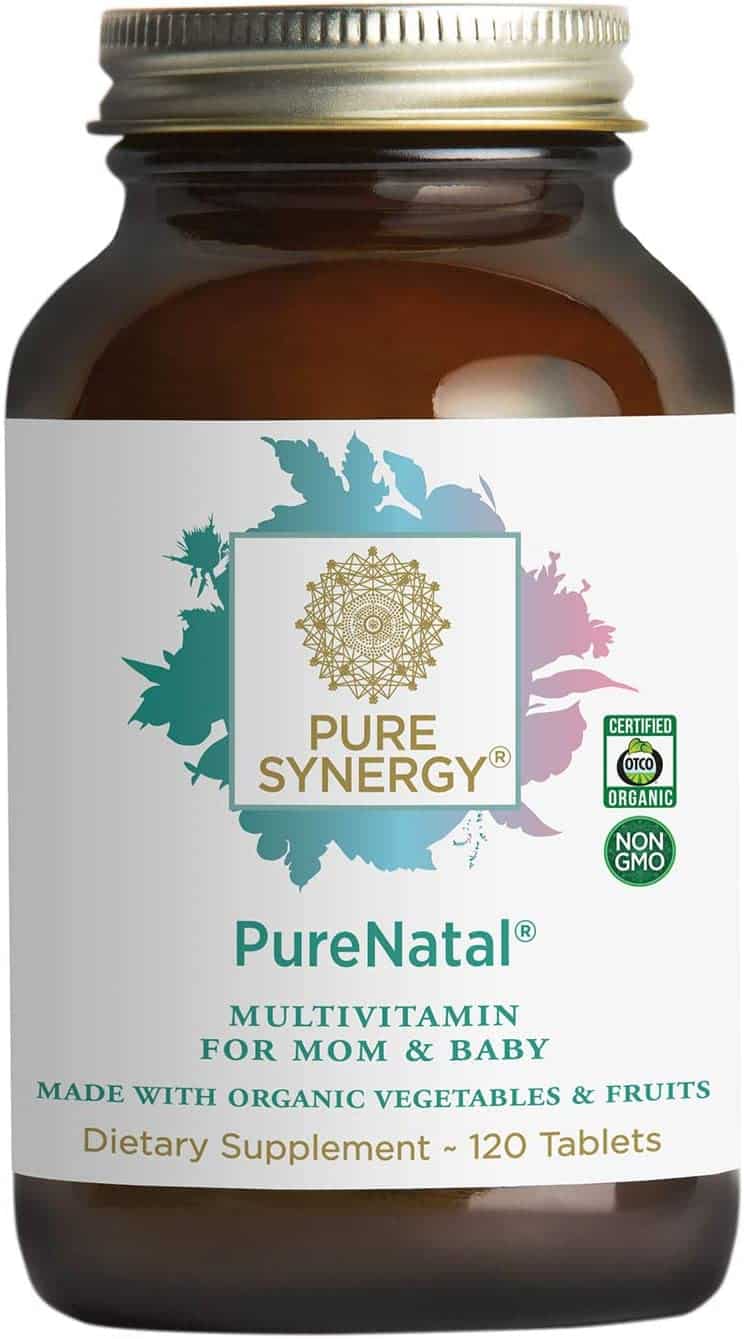
Vitamin IQ Whole Food Prenatal
At $34 for a months’ supply, is the most affordable of our Best Stuff prenatal brands.
You’ll need to take four capsules a day if you choose Vitamin IQ, but this is fewer than most other quality prenatals. This prenatal is slightly low in iron, but has more calcium than most prenatals do. This vitamin does not contain an omega-3 supplement.
Cost per month: $40
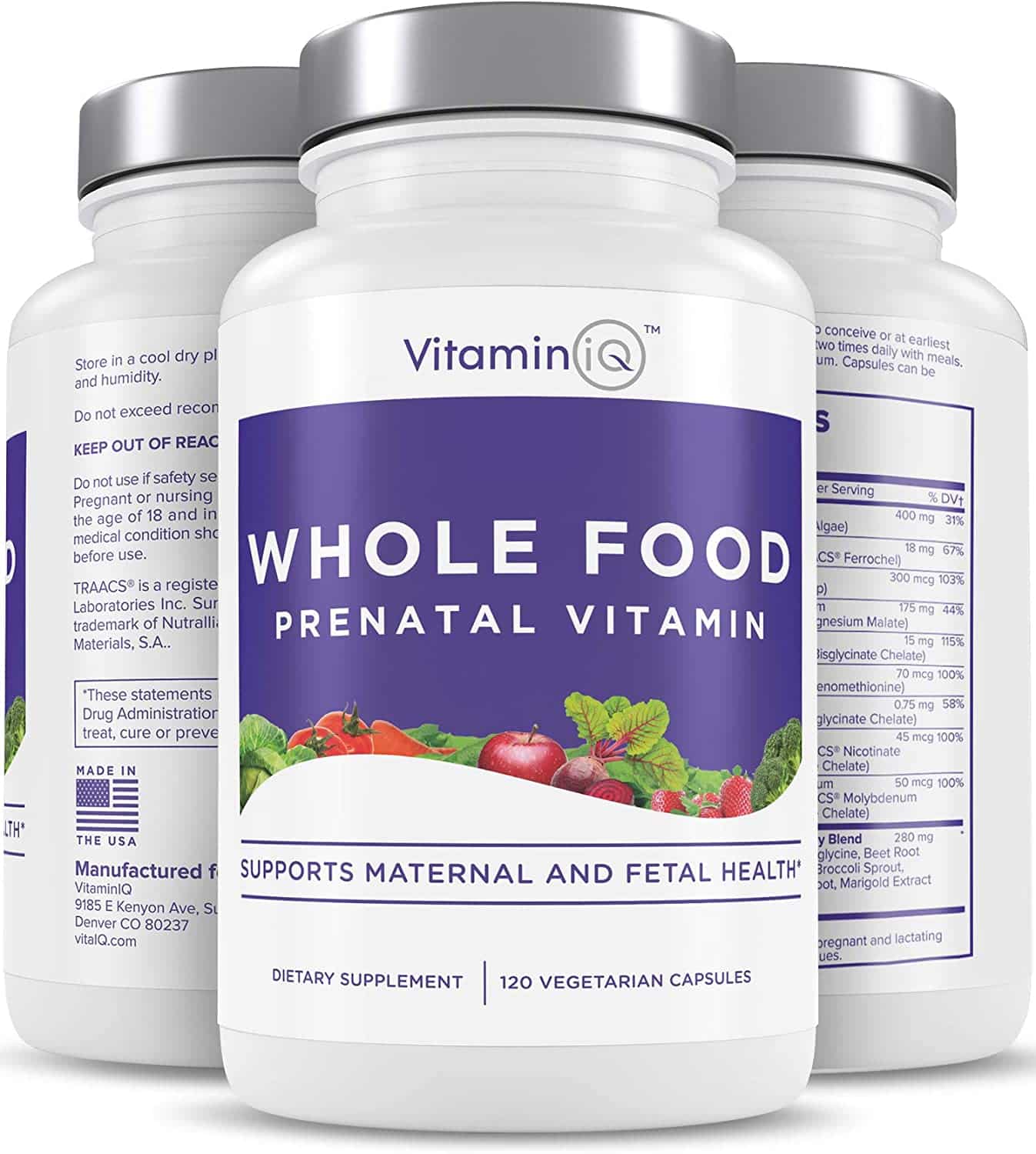
Good Stuff
FullWell Women’s Prenatal Multivitamin
The only thing keeping FullWell from being Best Stuff is that it has the unnecessary–although likely harmless–addition of magnesium stearate and silica (both anti-clumping additives)
Cost per month: $50
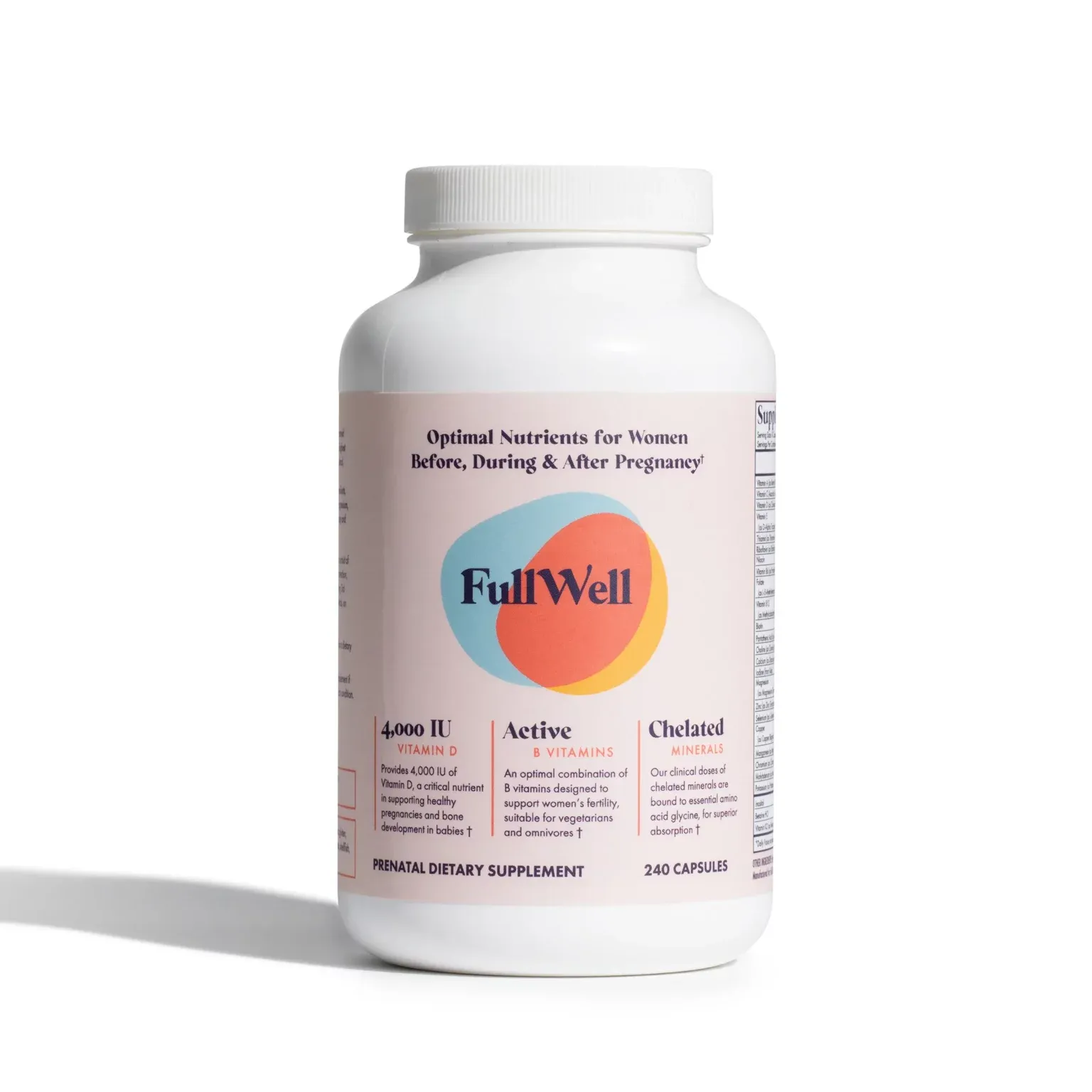
Mama Bird Prenatal Multi
This prenatal by Best Nest Wellness does everything we look for in the best prenatal vitamins. We call it Good instead of Best because it contains a range of unnecessary, though toxin-free, additives, such as magnesium stearate.
Cost per month: $39
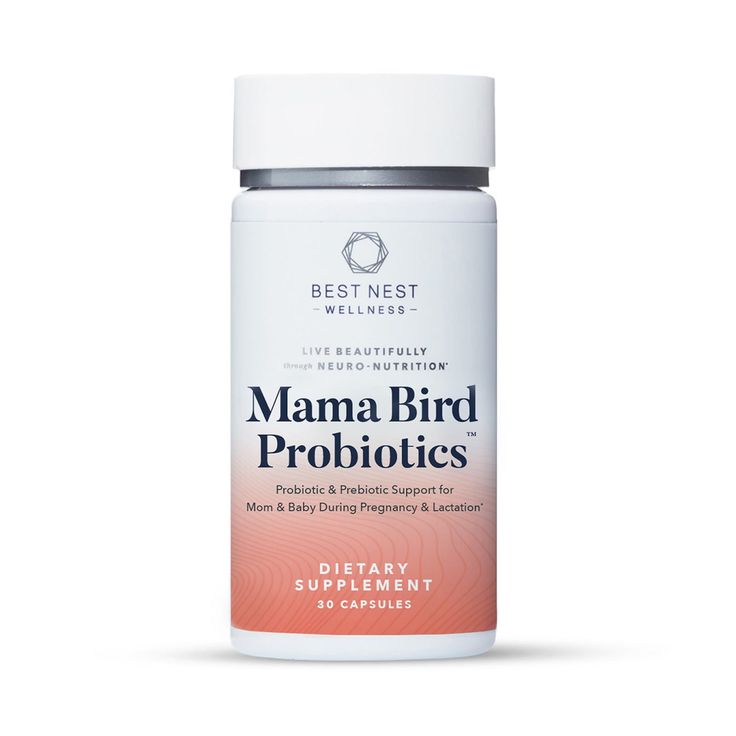
Ritual Essential Prenatal
We love Ritual for being the only prenatal vitamin on our list to contain (vegan) omega-3 oil, right there in one pill. Ritual does NOT include calcium, because they feel most women get this from their diets and it can impede the absorption of iron. We agree with their thinking on this. Ritual is also one of the very few prenatal capsules with an enteric coating to improve absorption of nutrient
Taking Ritual prenatals only requires swallowing a couple of pills a day, and is among the more affordable brands.
While Ritual has always been quick to respond to our (many!) questions, and they have top level testing, we have not actually seen their COA and therefore they are Good stuff rather than Best Stuff.
Cost per month: $39
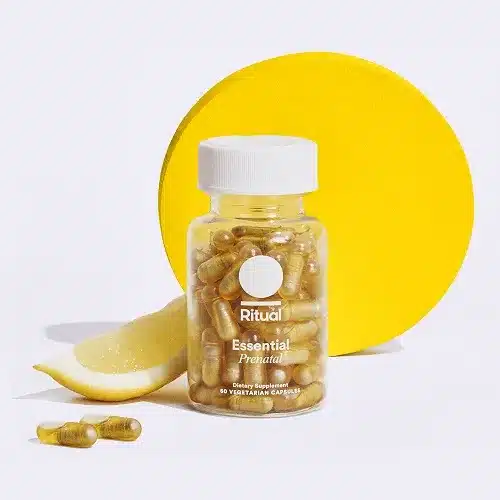
Seeking Health Optimal Prenatal
This prenatal vitamin checks a lot of our Best Stuff boxes, and Seeking Health provided us with a sample COA from third-party lab testing for heavy metals.
We are calling it only Good Stuff as it contains ascorbyl palmitate (preservative), microcrystalline cellulose (anti-clumping), and silica (anti-clumping).
They use D3 derived from lanolin so these aren’t vegan. With eight capsules a day, this involves a lot of pill-popping. On the other hand, Seeking Health’s prenatal does come in a powder for a chocolate shake which contains minimal added filler/preservatives/sugar except it does contain natural flavors. Perhaps the most important thing to note about this prenatal is that it doesn’t contain iron.
Cost per month: $31
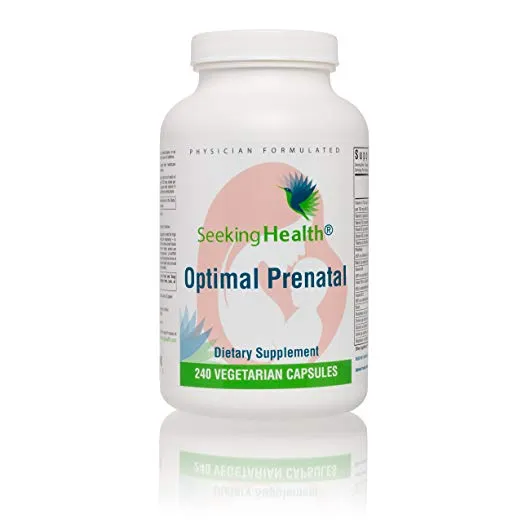
Okay Stuff
Klaire Labs Prenatal & Nursing Formula
Klaire’s prenatal checks all the boxes to be included in our Best Stuff category, except that only healthcare providers are able to access their COA. If they decide to send me one, I am happy to move them up!
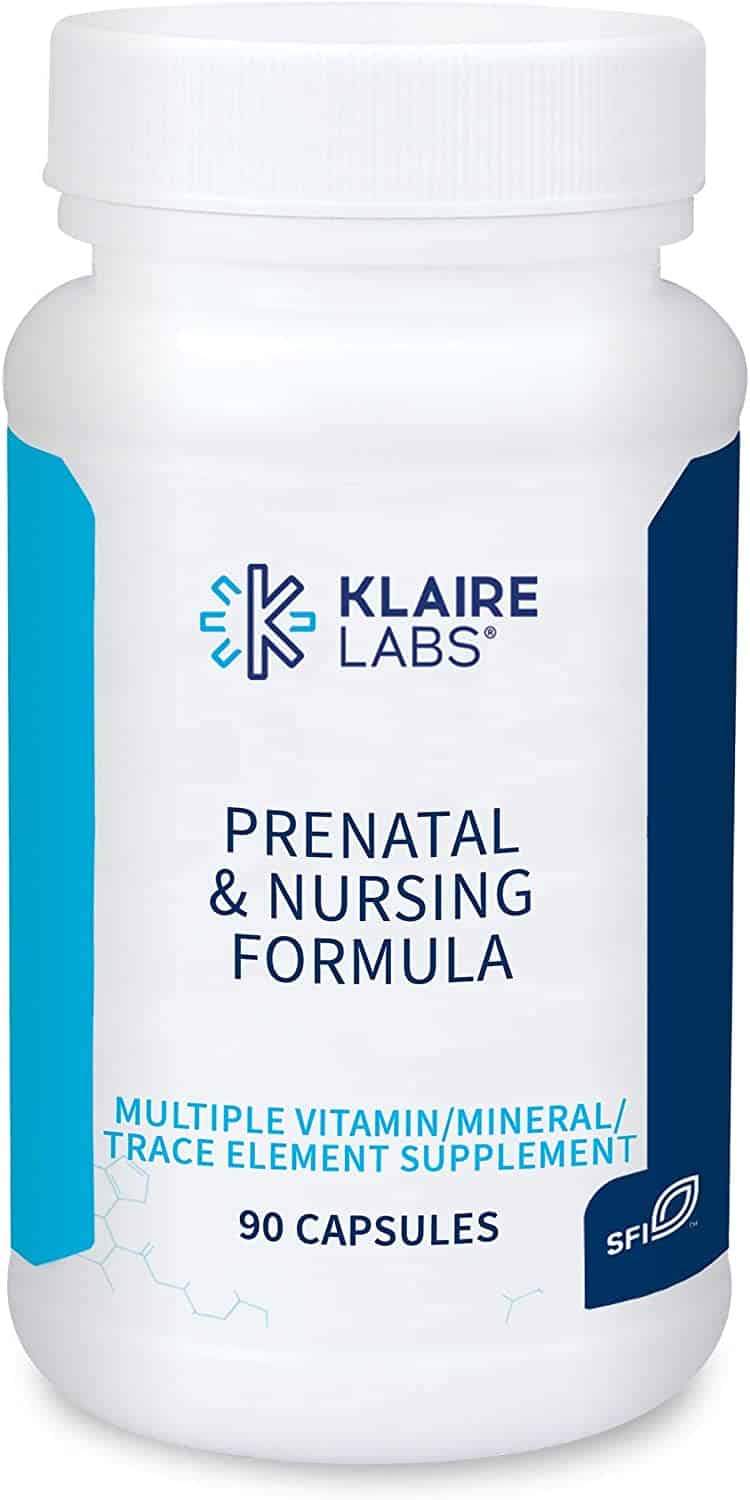
Zahler Prenatal + DHA
After we published this updated guide, Zahler reached out to provide their COA. While it is from their own facility’s in-house testing (rather than a third-party lab), they receive a high score from Labdoor, which does function as an independent lab.
Some of you will appreciate that Zahler uses kosher gelatin. We don’t consider this brand Best Stuff because it contains vegetable glycerin and triglycerides. It also isn’t Good Stuff because it contains sunflower lecithin.
Cost per month: $30
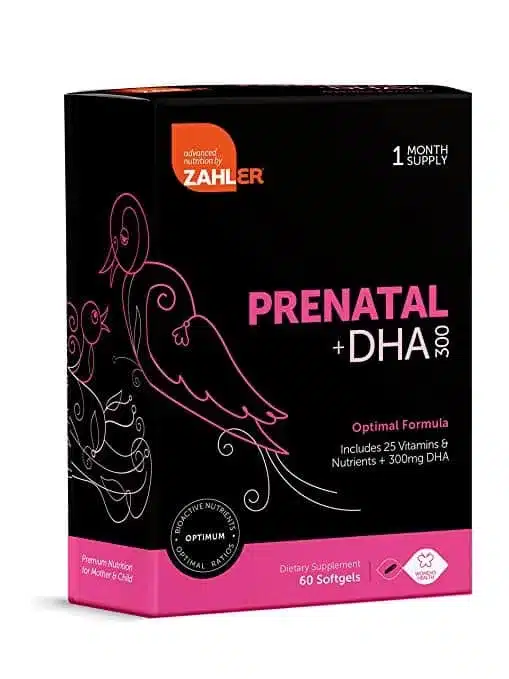
Bad Stuff
There were no pleasant surprises to be uncovered in the prenatal vitamin space. Stay away from all the drug-store brand prenatal vitamins (One-a-Day, Vitafusion, GNC, Centrum, etc.).
In addition, we have to call out Love Wellness and Persona for confirming with us that they do not conduct any third-party testing. Because of the tremendous issues with quality regulation and oversight when it comes to supplement marketing and manufacturing, a complete absence of third-party testing is a big problem for any brand claiming to offer a premium product.
The Deva prenatal use folic acid instead of methylated folate, the ingredient list includes fillers and preservatives, and they use D2 instead of D3 and cyanocobalmin rather than methylcobalmin for B12.
What About Gummy Prenatals?
While it’s tempting to take a chewable prenatal that tastes like Sour Patch Kid, we found that gummy prenatals contained no iron and were loaded with sugar and other fillers.
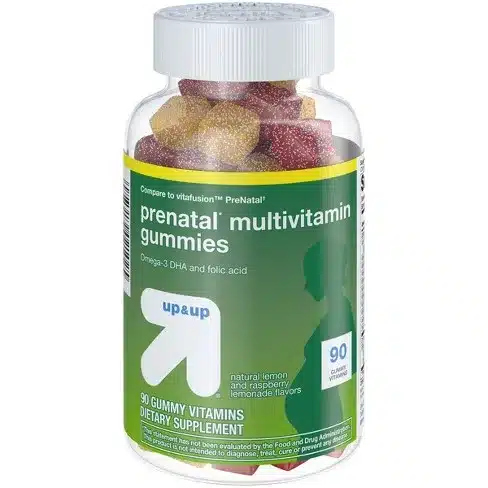
Sneaky Stuff
Garden Of Life Vitamin Code Raw Prenatal
Because Garden of Life’s prenatal doesn’t contain choline, they wouldn’t have made our Best Stuff list even if they had provided us with a third-party COA. They told us that they conduct both in-house and third-party testing for quality control, but they won’t give a name of the lab they use. They said that their lab partners “do not wish to be contacted.”
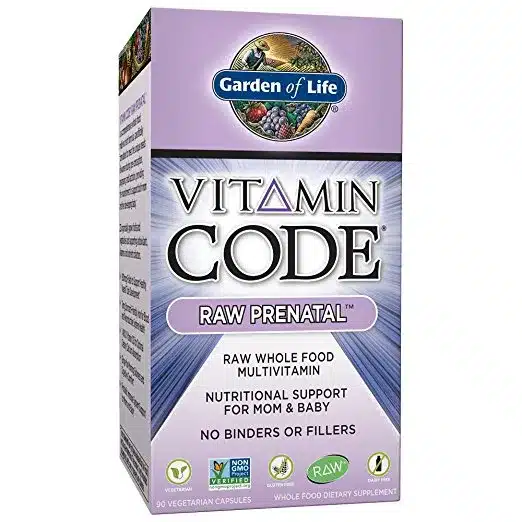
Natalist Prenatal Daily Packets
Natalist looked great (and a bunch of you asked us about it). Unfortunately, it contains titanium dioxide, which is banned in food products in Europe because of carcinogenic properties.
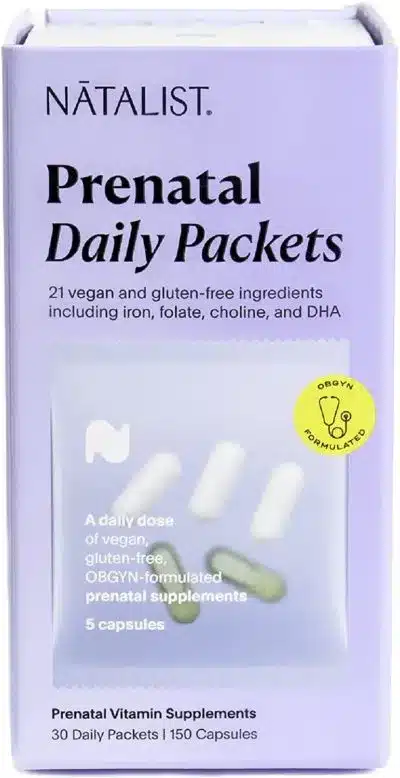
Rainbow Light Prenatal One
This is the prenatal I took during both of my pregnancies, before going down this research rabbit hole! I was hoping to discover it is at least Good Stuff, but alas, Rainbow Light is Sneaky. When we called, the customer service rep knew absolutely nothing, took down our phone number and questions, and never got back to us. But that’s not all. Rainbow Light prenatal should be avoided because of this scary news.

Whole Earth & Sea Women’s Prenatal
We were excited about this brand, and their initial response was promising as well! They provided us with a COA, and stressed how their lab (ISURA) is an “independent organization, separate from Whole Earth & Sea.” But when Dr. Hopkins looked into this organization, it was clear that ISURA is a branch of the same parent company, Natural Factors.
Of course it’s possible that the lab testing is truly independent, but the clear conflict of interest coupled with the insistence that the lab is a separate entity feels Sneaky to us.
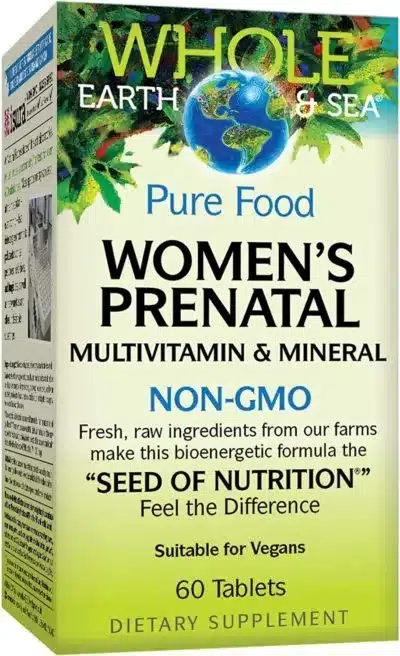
Sources
This list of sources show the peer-reviewed primary source data Dr. Hopkins used to make his recommendations. We also checked recommendation guidelines from the American College of Obstetricians and Gynecologists (ACOG), the Mayo Clinic, and the Institutes of Medicine’s (IOM; aka Federal Guidelines) Recommended Dietary Allowance (RDA) and Tolerable Upper Intake Levels (UL) for safety.
There are some confusing aspects regarding recommendations from these various bodies. This can lead to variations in how the guidelines are interpreted and how much of each nutrient is recommended in a prenatal supplement. Once again, Dr. Hopkins’ scientific background was immensely helpful in making sense of the data and coming up with solid recommendations.

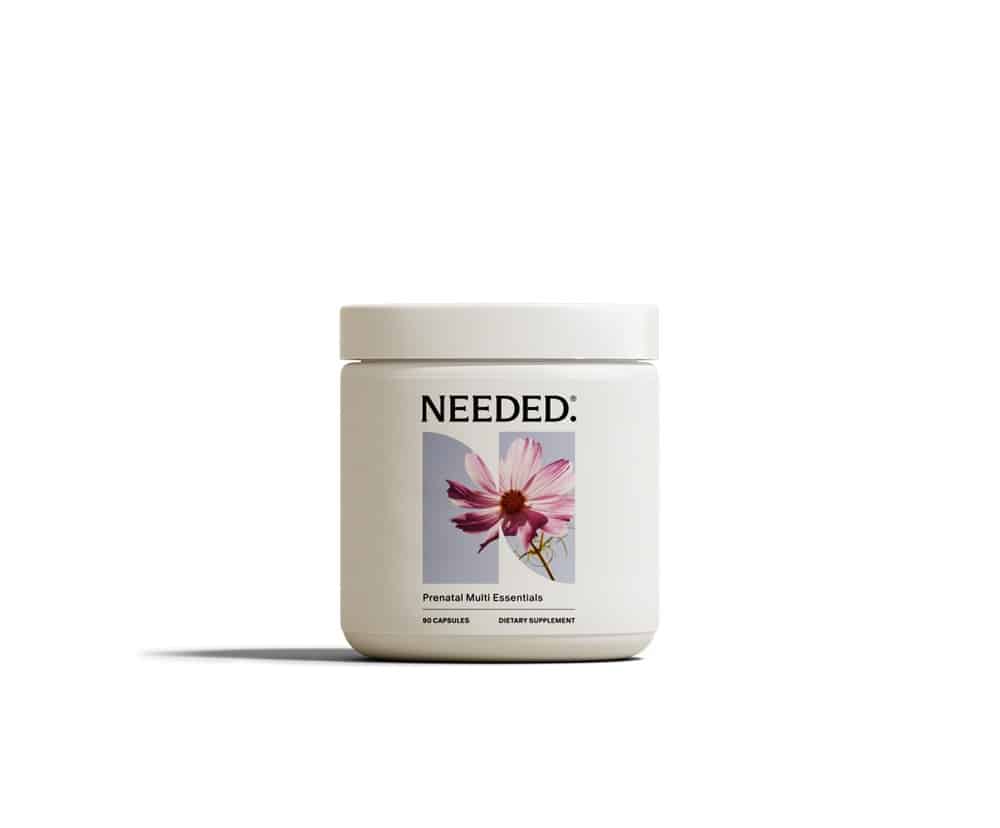
Thank you so much for updating this guide! So much has changed since I had my last baby and there are so many new options on the market that it makes my head spin. As always though, you are there to help us sort through it all!
Question about the additives. You said that Full Well would have made the “Best Stuff” category if not for the addition of magnesium stearate and silica. However, Heathynest’s prenatal also contains both of those. Why did Full Well get dinged for that and not Healthynest? I was pretty sold on Healthynest but after seeing that I wasn’t sure if I should go with Needed or PureNatal instead. Their prenatals don’t seem to contain any of those additional ingredients.
Also, Healthynest seems to be a little lower in Folate. It only has 600 mcg DFE, which I believe translates to roughly 360 mcg. Although the %DV does appear to be 100%. Whereas Needed’s contains 551 mcg and Ritual’s (which I was previously taking) contains 600 mcg. I thought the minimum was 400 mcg, but maybe that’s wrong.
Also, maybe not an issue since many of us probably get extra Folate from our diet, but curious your thoughts on that as well.
Thanks!
Great information! Have you heard of Actif Prenatal Vitamins?? They are very popular on Amazon. Claim to be organic and non-GMO but don’t seem to have any certifications to prove it. What are your thoughts? Anyone used them during their pregnancy?
I’m thinking of switching to MegaFood.
Thank You!
Don’t know this brand–but adding to our list for when we update this guide:)
Actif is now included under Brands We Cannot Rank
The MTHFR mutation is much more than just not being able to process synthetic folic acid. Certain synthetic B vitamins, in general, cannot be processed either. There is a rabbit hole of information about MTHFR, it is a lot to understand and I think it would actually be super helpful to have a link to more info or even a disclaimer about not knowing all the ins and outs of it. That being said, I was so excited to see some awareness about the MTHFR in a supplement guide! Thanks!
Thoughts on Full Circle prenatal and Ancient Nutrition prenatal?
Hey,
I really like your website. I appreciate your hard work. I want to know how is actif brand prenatal, it is vegetarian and organic.
Thankyou
Hello Maia,
Do you recommend any multivitamins brands for children? As the kids are picky eaters sometimes I’m worried if they’re getting all the vitamins
Yes, we have a post on multivitamins on our site:)
Hello Maia,
I bought MegaFood after reading your Prenatal reviews. I bought Mega Baby & Me 2. I thought MegaFood is the best that would fit my Pregnancy prenatal needs. However, I came across this on Amazon. One reviewer said that “S. cerevisiae is beer/bread yeast and It does NOT make D3 (cholecalciferol) naturally. It makes D2 (ergocalciferol), which is similar, but definitely not the same. In theory, it is possible to engineer yeast to make D3, but definitely not without the final organism being GM.”
What do you think about it? Just want to know your thoughts because MegaFood says they are organic and non-GMO. And I also do not now if I should worry about it being D2 though final product is D3.
You say this about Thorne-
“While this brand is highly ranked by several bloggers, it’s not food-based and appears to use chelated metals for most of its minerals.”
Is this not true for Ritual??
Thanks!!
These are some great tips on prenatal vitamin guide that you have discussed here. I really loved it and thank you very much for sharing this with us. You have a great visualization and you have really presented this content in a really good manner.
innate shows a D grade on puremarket.com. is that a reputable site?
Yay! Thank you. I love that you love Ritual! I’ve been taking it for 6 months now. Am a bit concerned about choline being low now, I didn’t consider that. Do you have a choline supplement you’d recommend? How much choline is regularly needed?
I received my ritual Prenatal and been taking it. Then I realized that FOLATE in my bottle is 1700 MCG DFE (1000 mcg). Is that too high? They recently changed it to 1000 MCG DFE which is lower dose than in their Essential for Women that has 1020 MCG DFE (600 mcg). That means their Folate in new formulation is only a little over 400 mcg, which I worry if too small a dose for pregnant women. Most prenatal vitamins contain 600 mcg of Folate/folic acid. Also frustrating is that they are subscription based, and delivery sucks. I miss days of taking prenatal because the delivery is not on time. What makes it worse is that they are out of stock now.
Hi, I asked them about this and this is their response: Thanks for reaching out! The Recommended Dietary Intake (RDI) for folate in pregnancy is 600 mcg DFE. The RDI is the daily intake level of a nutrient that is considered to be sufficient to meet the requirements of 97–98% of healthy individuals in the United States. The US Preventative Services Task Force (USPSTF) recommends a daily supplement of 400–800 mcg folic acid for all women who are planning or capable of pregnancy.” (400-800 mcg of folic acid is the equivalent of about 667 to 1333 mcg DFE—making our dose of 1000 mcg DFE right in the middle.) Our previous dosage of folate is considered safe, but we reduced it because new research suggests higher dosages does not necessarily provide additional benefits.
Hi Maia,
I read your safe product guides regularly and I love them! Thank you for helping me make a change to our household products and a healthier environment for my family. I am currently expecting our third and this is the first time I am using a “prenatal vitamin” for pregnancy, with my first two I actually took Juice Plus (3 of each of fruit and vegetable blends per day as opposed to the standard 2) plus an omega3 supplement (cod liver oil) and of course extra vitamins from my diet especially ones high in folate. I’m curious as to your opinion about using juice plus instead of a prenatal?
Hi Maia, thanks for putting together useful information, can i ask your feedback on Vitamin IQ prenatal and Naturelo Prenatal (i was able to find both of brands certificate of authenticity (COA) lab results online).
This article is hugely helpful but I’m still feeling quite lost about Folate. This recommends Ritual but it seems to me like Ritual has WAY more Folate than is recommended – especially if we are only suppose to get 600 mcg DFE. I’m having a hard time finding a prenatal that is free of heavy metals but also doesn’t have a very high level of folate.
This site’s testing has me nervous about many of the major vitamins.
https://www.puremarket.com/search/?refinementList%5Btaxonomies_hierarchical.product_cat.lvl1%5D%5B0%5D=Health%20%26%20Fitness%20%3E%20Prenatal%20Vitamins
Any thoughts on Garden of Life MyKind Organics Prenatal Multi?
Thanks!
Hi Maia,
How do you feel about Klaire Labs Prenatal vitamins?
Wow, thank you so much for all of your efforts! I wanted to add to your list Intramax. It is the best multivitamin out there that I have found and wanted you to compare it with your friend. I found a dosing protocol for pregnancy which is different than those who are just taking them for regular health maintenance reasons. It is not meant as a prenatal vitamin but a regular multivitamin so it has trace amounts of choline, both calcium and iron, but it has so many other vitamins and minerals. I think it could be used as a prenatal vitamin along with a choline supplement. Let me know what you think and/or find out or know about it. Thanks!
Awesome article, thanks for all the foot work you have done in research. Can I ask, have you researched My Kind Organics Garden of Life prenatal vitamin? They claim that it is food based and has folate instead of folic acid on the label and is only $20 a bottle. Do you think it is legit?
What about Garden of Life My Kind certified organic Wholefood, prenatal once daily?
I took Garden of Life once a day prenatals. It seemed pretty wholesome, and I was trying to take the best thing I could find prior to and through my pregnancy. I was hoping to see it on here and I was nervous that it would be just okay, or even sneaky. Just curious as to where they stand?
Maia,
Thanks for finally replying. I did read that part of your post and appreciate you mentioning it. That line needs to be developed more because it is a critical piece of your guide and transparency in this space for your readers. GOL or anyone else is not producing a “raw” prenatal. That is impossible unless someone is taking a truly whole food prenatal that contains raw natural ingredients and even then the term “raw” isn’t regulated unless one looks to the RAW and CLEAN standards (https://cleanfoodcertified.org). The issue of country of origin of the vitamins should also weigh heavily in your rankings of a brand. All Chinese vitamins should be a mark down for a brand. Consumers looking to support a natural brand like the ones mentioned would likely want to know if that brand is secretly support Chinese vitamin companies that are polluting the environment. It was so bad the Chinese government finally did something about it recently and prices for all vitamins shot up.
This is an update to let you know that for this update we did follow up with the sources you recommended and it helped us gain clarity around the misleading marketing of “whole foods” supplements and the reality of synthetic versus natural isolates. Thanks again! We would love your feedback on this updated guide.
I’ve worked in the supplement industry 10 years. While Maia and Michael did their best with this guide it isn’t accurate on many levels. I’ve emailed them 3 times addressing many of the errors but never heard back. One example, claiming the Garden of Life Prenatal is raw is not even remotely accurate. That is all marketing on GOLs part. I have no dog in this fight other than fighting misinformation on the topic. The vitamin category in the supplement space is shady. All of the ‘whole food’ prenatals or vitamins are spiked with synthetic vitamins but presented as if they are extracted from whole foods. Mega Foods, New Chapter and a few others have updated their labels and listed synthetics so it is more accurate but even New Chapter’s wording on the supplement facts panel makes it sound like the nutrients are from the fermentation broth. Yes, a small amount but most all of it is from synthetics. They did this because they got bought out by the big boys (see second Woodstock Vitamins link below)! One big hold out is Purenatal (and the rest of their vitamins) by The Synergy Company. Even with their new rebranding they chose to continue to hide they ferment whole foods with synthetics. An outsider would read the label and think it’s all extracted from food. Not so! They are privately held and are willing to run the risk and take advantage of weak rules on supplement labeling. There isn’t a truly whole food prenatal on the market. Most synthetic vitamins are from China or India. Very few use sources from elsewhere because of price and market dominance by those two countries. As of a couple years ago Purenatal was sourcing non-Chinese synthetics but I’m not sure if that has changed. If you want more details on different types of vitamins and who owns who, check out these Woodstock Vitamins articles on the topic (https://www.woodstockvitamins.com/blogs/learn/the-garden-of-lies) (https://www.woodstockvitamins.com/blogs/learn/the-mega-corporations-that-own-your-supplement-brand). Neal is an insider with in-depth knowledge on the topic and something Maia and Michael will never get to unfortunately because they are not from the industry. It’s too complicated for outsiders, sadly.
For anyone that needs some real guidance on pregnancy nutrition then reach out to Josh Boughton. He has more knowledge than anyone I know in the industry. He is an herbalist, industry consultant for 15+ years, honest, smart and funny. He truly cares about the industry and being honest about what he recommends and sells. The quality checks that he goes through to ensure what he sells is truly a quality product is second to none.
https://www.joshboughton.com/pregnancy
Again, I have no financial relationship with Josh or Neal. They are some of the few telling the truth and it is enlightening, frustrating and refreshing to learn the truth. I’m simply tired of blog posts such as this getting it so wrong, not editing the content based on feedback and then inadvertently misleading their readers. I’m a fan of what Maia is doing and use and respect her guides but not her supplement guides. -Chase
Hi Chase-Thanks for taking the time to write in, and I’m sorry that we’ve not had time to respond to your emails personally (we don’t have the capacity to respond to individual emails anymore, unfortunately). You’ll notice that we did actually explain the following in the post: “One particularly sneaky move involves culturing cheap synthetic vitamins in yeast and then using the yeast culture as if it’s a “food-based” form.
It’s unclear if these yeast cultured vitamins are less effective than truly food-based ones, but either way, it’s not the type of transparency we like to see in our Good Stuff Brands! (Garden of Life does this, but we give them a nod as the only raw organic prenatal vitamin we could find.)”
I will definitely reach out to Josh to learn more.
Thanks again!
-Maia
Hi some of the vitamins you posted in the good stuff like raw vitamin code have stearates, these are known cancer causing agents. These are anti-caking agents. You may want to look into this. Also, I found this prenatal and it seems pretty impressive, I would be interested in your thoughts, nutrigold prenatal. Thanks for this website, it’s been very informative and helpful 🙂
Can you please confirm where you received info regarding stearates in GOL Raw vitamin line? Our whole family uses the Raw line (men’s, women’s, family/kids, and prenatal). I personally called to check up on this and the response that I received is that it’s a chelated form derived from whole food sources and not classified as a citrate or malate form of magnesium. I tend to believe this as they do contain the correct forms/sources of other vitamins/minerals to include Folate, D3, B12, Iodine etc. We’ve been very happy with the RAW vitamins line for several years now, however, I do like to stay informed. If you can please provide any concrete info regarding your claims I’d greatly appreciate it, thanks!
Hi there-Thanks for putting Nutrigold on our radar! We will definitely look into this brand when we update the guide. As for the stearates, we did look into those and I know they are controversial. Ultimately, we sided with Dr. Ax on this (I’m a big fan of his), who says;
“The bottom line is this: Like most fillers and bulk additives…stearate isn’t healthy in high doses, but it’s definitely not as harmful to consume as some make it out to be because it’s typically only available in minuscule doses.”
Hi Maia -What are your thoughts on the Best Nest prenatal? I’m struggling with GI issues (constipation mostly) and Ritual prenatal isn’t working for me because of it. Trying to find an alternative prenatal or just a good multi-vitamin to take along with a separate folate. Thanks!
My son is 4 years old now and I am expecting my second baby. I was looking for information on prenatal vitamins and came across your post & https://www.whattoexpect.com/getting-pregnant/health-and-wellness/foods-to-enjoy/prenatal-vitamins.aspx. The ideas on prenatal vitamins are so much in detail and they are so useful. During my first pregnancy though my diet was good I am upset that I didn’t do my research beforehand on what prenatal vitamins should I take because of some dangers with certain synthetic forms. But this time I am happy because I got to know so much from your blog and I can choose from a variety of products depending upon my need for the vitamins. Very informative I loved this.
Yikes, no even a word on Nature’s Made prenatal. Im worried now since i took that on my first pregnancy. And even though, my diet was pretty good, Im so frustrated i didnt do my research beforehand as there could be some dangers with certain synthetic forms, like folic acid! Thanks for this list, you are awesome!
Hey! I loved this article and switched to the Ritual pre-natal. Unfortunately I need to provide some really vital feedback. They only send you enough for 30 days and you cannot buy them in a store (shipment service only). They send you and email saying they will get there with a day or so (which was scary of course but I trusted their service) but to my dismay I am supposed to receive them today and it shows on the USPS site that they only brought them to the USPS facility THIS MORNING. As you can imagine I am a crazy pregnant lady and I threw a huge fit (I have yet to hear back from them). But now on top of that stress I need to go buy new vitamins and it’s a all big thing. Basically, who cares how great a vitamin if their shipping is shitty and you don’t end up being able to take them because they didn’t arrive? This experience alone is making me cancel this damn subscription and going back to one I can buy in a store to eliminate any uncertainty.
UPDATE: After several phone calls and them telling me that it would arrive on time (it didn’t) they sent me a free bottle so that this would not be an issue again. I appreciate them sending me another bottle as a buffer for sure.
I’m wondering what you’d recommend for someone who has to avoid iron supplements? (I have hereditary hemochromatosis which causes my body to absorb & store excess iron.)
Hi Natalie-
I haven’t had time to look into this deeply, but at quick glance this one looks like a great choice for someone who can’t have iron:
https://amzn.to/2Vl7LSc
Very informative! I’d like to share some helpful applications for future mums with which you can communicate with other future parents, track all the necessary measurements, keep your health under control, get daily info and so much more: https://freeappsforme.com/best-pregnancy-apps/
Is the Boron in the RITUAL natural or synthesized? It appears to be synthesized from what I have been able to dig up, but I can’t confirm. Are there other synthesized nutrients as well (in addition to the choline and possibly boron)? I was excited to see this new “all natural” prenatal, but now I am not so sure about the use of multiple synthetic ingredients. Thanks again for all of your research on this. I know how time consuming it can be 🙂
Yes, Ritual uses some synthesized nutrients, but they’ve done careful research about which might actually be better in their synthesized form.
This is such a great resource! I will be switching from Thorne to a better prenatal right away! Any chance you can do a non-prenatal multi-vitamin guide next? I’d love to make sure my husband is taking a quality multi! Thanks!
Ha, sure! We haven’t done a full guide, but we did a post here: https://gimmethegoodstuff.org/best-multivitamins/
Also, I don’t see New Chapter’s Prenatal when in the NSF-certified products database. There are other products listed for the brand, but not the prenatal. Can you look back into your sources that say it is NSF certified?
I am trying to get a handle on the different certifications out there. What do you know about the C.L.E.A.N. certification? I have come across that one on a supplement as well, but many don’t have it. Thanks!
What about NutriGold?
Hello Maia,
Do you also recommend “Essential for Women” as a multivitamin, for those of us who are not pregnant, (https://ritual.com/products/essential-for-women-multivitamin) based on your prenatal guide: https://gimmethegoodstuff.org/safe-product-guides/organic-prenatal-vitamins/?
Let us know and thank you for all your good work. It’s appreciated.
Yes, I love this one!
Thanks for this list. I have the MTHFR mutation and got a prescription from a genetic/MTHFR specialist for Klaire labs prenatal & nursing formula. Here is the link to the vitamin list: https://klaire.com/prn-prenatal-nursing-formula. What are your thoughts on this? I already had my baby and had placenta insufficiency due to blood clots in my placenta and through that I discovered that I have blood clotting genetic disorder including MTHFR mutation. So doing as much research as I can now on prenatal for next baby. Thanks!
Have you looked at Best Nest Wellness? Its made with organic fruits and vegetables, probiotics, digestive enzymes and whole food based vitamins and minerals. Its gluten, soy free and one a day. It has the correct Vit A, E and methylfolate. Id love to know your opinion on this brand.
Have you looked at Prenatal with DHA by Orthomolecular? My functional medicine doctor did a lot of research and recommended this for people who have the gene mutation MTHFR.
What about MyKind Organics Prenatal Vitamin? I was excited to see a gummy vitamin that was organic and had Folate instead of Folic Acid. Is there anything questionable about it?
I take this one as well and didn’t see it on the list and was curious
if they researched it. ???
WOOT! Thanks for this, when your guides release a recommendation, I am all over it. I share your guides with so many people!
One of the best posts I have seen on prenatals, thanks to Michael for digging up the research!
I had a prenatal visit today and showed my doctor the New Chapter prenatals I had been (inconsistently) taking. She thought the Vitamin A content was a bit high, and also noted their horse pill size (hence me not being consistent). She gave me samples of a gummy prenatal called Vitafol and gave me a prescription for it. Of course, my insurance doesn’t cover it and it’s $440, so I did not fill it. I love your lists, and this one was so timely. Just wondering, if you had to pick the best of the worst/gummies which would it be?
Halfway through my pregnancy and have been taking Garden of Life Vitamin Code Raw Food Prenatal and saw that it’s only ranked as Okay Stuff – hoping this is ok 🙁
I personally like/ trust taking Pure Synergy’s Prenatal. Have you ever looked into this one? Organic, whole food based.